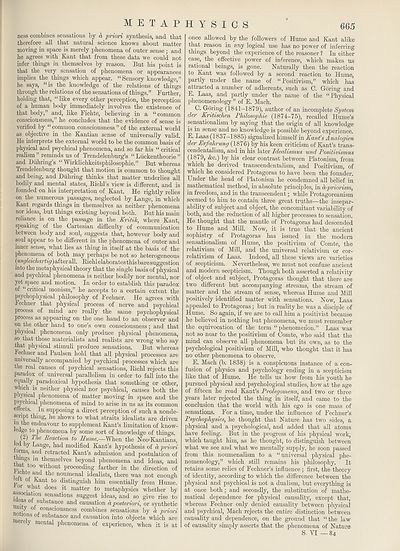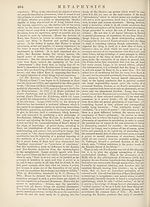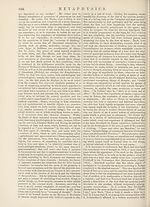New volumes of the Encyclopædia Britannica > Volume 30, K-MOR
(709) Page 665
Download files
Complete book:
Individual page:
Thumbnail gallery: Grid view | List view

M E T A P
ness combines sensations by a priori synthesis, and that
therefore all that natural science knows about matter
moving in space is merely phenomena of outer sense; and
he agrees with Kant that from these data we could not
infer things in themselves by reason. But his point is
that the very sensation of phenomena or appearances
implies the things which appear. “ Sensory knowledge,”
he says, “is the knowledge of the relations of things
through the relations of the sensations of things.” Further,
holding that, “ like_ every other perception, the perception
of a human body immediately involves the existence of
that body,” and, like Fichte, believing in a “common
consciousness,” he concludes that the evidence of sense is
verified by “ common consciousness ” of the external world
as objective in the Kantian sense of universally valid.
He interprets the external world to be the common basis of
physical and psychical phenomena, and so far his “ critical
realism ” reminds us of Trendelenburg’s “ Liickentheorie ”
and Diihring’s “ Wirklichkeitsphilosophie.” But whereas
Trendelenburg thought that motion is common to thought
and being, and Diihring thinks that matter underlies all
bodily and mental states, Biehl’s view is different, and is
founded on his interpretation of Kant. He rightly relies
on the numerous passages, neglected by Lange, in which
Kant regards things in themselves as neither phenomena
nor ideas, but things existing beyond both. But his main
reliance is on the passage in the Kritik, where Kant,
speaking of the Cartesian difficulty of communication
between body and soul, suggests that, however body and
soul appear to be different in the phenomena of outer and
inner sense, what lies as thing in itself at the basis of the
phenomena of both may perhaps be not so heterogeneous
(ungleicJiartig') after all. Riehl elaborates this bare suggestion
into the metaphysical theory that the single basis of physical
and psychical phenomena is neither bodily nor mental, nor
yet space and motion. In order to establish this paradox
of “critical monism,” he accepts to a certain extent the
psychophysical philosophy of Fechner. He agrees with
Fechner that physical process of nerve and psychical
process of mind are really the same psychophysical
process as appearing on the one hand to an observer and
on the other hand to one’s own consciousness ", and that
physical phenomena only produce physical phenomena,
so that those materialists and realists are wrong who say
that physical stimuli produce sensations. But whereas
Fechner and Paulsen hold that all physical processes are
universally accompanied by psychical processes which are
the real causes of psychical sensations, Riehl rejects this
paradox of universal parallelism in order to fall into the
equally paradoxical hypothesis that something or other,
winch is neither physical nor psychical, causes both the
physical phenomena of matter moving in space and the
psychical phenomena of mind to arise in us as its common
effects. In supposing a direct perception of such a nonde¬
script thing, he shows to what straits idealists are driven
in the endeavour to supplement Kant’s limitation of know¬
ledge to phenomena by some sort of knowledge of things.
(2) The Reaction to Hume.—When the Necr-Kantians,
led by Lange, had modified Kant’s hypothesis of a priori
lorms, and retracted Kant’s admission and postulation of
things in themselves beyond phenomena and ideas, and
hat too without proceeding farther in the direction of
i’lchte and the noumenal idealists, there was not enough
eit of Kant to distinguish him essentially from Hume,
or what does it matter to metaphysics whether by
association sensations suggest ideas, and so give rise to
eas o substance and causation a posteriori, or synthetic
0 consciousness combines sensations by a priori
ions o substance and causation into objects which are
lerely mental phenomena of experience, when it is at
H Y S I C S 665
once allowed by the followers of Hume and Kant alike
that reason in any logical use has no power of inferring
things beyond the experience of the reasoner ? In either
case, the effective power of inference, which makes us
rational beings, is gone. Naturally then the reaction
to Kant was followed by a second reaction to Hume,
partly under the name of “ Positivism,” which has
attracted a number of adherents, such as C. Goring and
E. Laas, and partly under the name of the “Physical
phenomenology ” of E. Mach.
C. Goring (1841-1879), author of an incomplete System
der Kritischen Philosophic (1874-75), recalled Hume’s
sensationalism by saying that the origin of all knowledge
is in sense and no knowledge is possible beyond experience.
E. Laas (1837—1885) signalized himself in Kant's Analogien
der Erfahrung (1876) by his keen criticism of Kant’s trans¬
cendentalism, and in his later Idealismus und Positivismus
(1879, (fee.) by his clear contrast between Platonism, from
which he derived transcendentalism, and Positivism, of
which he considered Protagoras to have been the founder.
Under the head of Platonism he condemned all belief in
mathematical method, in absolute principles, in d-priorism,
in freedom, and in the transcendent • while Protagoreanism
seemed to him to contain three great truths—the insepar¬
ability of subject and object, the concomitant variability of
both, and the reduction of all higher processes to sensation.
He thought that the mantle of Protagoras had descended
to Hume and Mill. Now, it is true that the ancient
sophistry of Protagoras has issued in the modern
sensationalism of Hume, the positivism of Comte, the
relativism of Mill, and the universal relativism or cor-
relativism of Laas. Indeed, all these views are varieties
of scepticism. Nevertheless, we must not confuse ancient
and modern scepticism. Though both asserted a relativity
of object and subject, Protagoras thought that there are
two different but accompanying streams, the stream of
matter and the stream of sense, whereas Hume and Mill
positively identified matter with sensations. Now, Laas
appealed to Protagoras; but in reality he was a disciple of
Hume. So again, if we are to call him a positivist because
he believed in nothing but phenomena, we must remember
the equivocation of the term “phenomenon.” Laas was
not so near to the positivism of Comte, who said that the
mind can observe all phenomena but its own, as to the
psychological positivism of Mill, who thought that it has
no other phenomena to observe.
E. Mach (b. 1838) is a conspicuous instance of a con¬
fusion of physics and psychology ending in a scepticism
like that of Hume. He tells us how from his youth he
pursued physical and psychological studies, how at the age
of fifteen he read Kant’s Prolegomena, and two or three
years later rejected the thing in itself, and came to the
conclusion that the world with his ego is one mass of
sensations. For a time, under the influence of Fechner’s
Psychophysics, he thought that Nature has two sides, a
physical and a psychological, and added that all atoms
have feeling. But in the progress of his physical work,
which taught him, as he thought, to distinguish between
what we see and what we mentally supply, he soon passed
from this noumenalism to a “universal physical phe¬
nomenology,” which still remains his philosophy. It
retains some relics of Fechner’s influence; first, the theory
of identity, according to which the difference between the
physical and psychical is not a dualism, but everything is
at once both; and secondly, the substitution of mathe¬
matical dependence for physical causality, except that,
whereas Fechner only denied causality between physical
and psychical, Mach rejects the entire distinction between
causality and dependence, on the ground that “the law
of causality simply asserts that the phenomena of Nature
S. VI _ 84
ness combines sensations by a priori synthesis, and that
therefore all that natural science knows about matter
moving in space is merely phenomena of outer sense; and
he agrees with Kant that from these data we could not
infer things in themselves by reason. But his point is
that the very sensation of phenomena or appearances
implies the things which appear. “ Sensory knowledge,”
he says, “is the knowledge of the relations of things
through the relations of the sensations of things.” Further,
holding that, “ like_ every other perception, the perception
of a human body immediately involves the existence of
that body,” and, like Fichte, believing in a “common
consciousness,” he concludes that the evidence of sense is
verified by “ common consciousness ” of the external world
as objective in the Kantian sense of universally valid.
He interprets the external world to be the common basis of
physical and psychical phenomena, and so far his “ critical
realism ” reminds us of Trendelenburg’s “ Liickentheorie ”
and Diihring’s “ Wirklichkeitsphilosophie.” But whereas
Trendelenburg thought that motion is common to thought
and being, and Diihring thinks that matter underlies all
bodily and mental states, Biehl’s view is different, and is
founded on his interpretation of Kant. He rightly relies
on the numerous passages, neglected by Lange, in which
Kant regards things in themselves as neither phenomena
nor ideas, but things existing beyond both. But his main
reliance is on the passage in the Kritik, where Kant,
speaking of the Cartesian difficulty of communication
between body and soul, suggests that, however body and
soul appear to be different in the phenomena of outer and
inner sense, what lies as thing in itself at the basis of the
phenomena of both may perhaps be not so heterogeneous
(ungleicJiartig') after all. Riehl elaborates this bare suggestion
into the metaphysical theory that the single basis of physical
and psychical phenomena is neither bodily nor mental, nor
yet space and motion. In order to establish this paradox
of “critical monism,” he accepts to a certain extent the
psychophysical philosophy of Fechner. He agrees with
Fechner that physical process of nerve and psychical
process of mind are really the same psychophysical
process as appearing on the one hand to an observer and
on the other hand to one’s own consciousness ", and that
physical phenomena only produce physical phenomena,
so that those materialists and realists are wrong who say
that physical stimuli produce sensations. But whereas
Fechner and Paulsen hold that all physical processes are
universally accompanied by psychical processes which are
the real causes of psychical sensations, Riehl rejects this
paradox of universal parallelism in order to fall into the
equally paradoxical hypothesis that something or other,
winch is neither physical nor psychical, causes both the
physical phenomena of matter moving in space and the
psychical phenomena of mind to arise in us as its common
effects. In supposing a direct perception of such a nonde¬
script thing, he shows to what straits idealists are driven
in the endeavour to supplement Kant’s limitation of know¬
ledge to phenomena by some sort of knowledge of things.
(2) The Reaction to Hume.—When the Necr-Kantians,
led by Lange, had modified Kant’s hypothesis of a priori
lorms, and retracted Kant’s admission and postulation of
things in themselves beyond phenomena and ideas, and
hat too without proceeding farther in the direction of
i’lchte and the noumenal idealists, there was not enough
eit of Kant to distinguish him essentially from Hume,
or what does it matter to metaphysics whether by
association sensations suggest ideas, and so give rise to
eas o substance and causation a posteriori, or synthetic
0 consciousness combines sensations by a priori
ions o substance and causation into objects which are
lerely mental phenomena of experience, when it is at
H Y S I C S 665
once allowed by the followers of Hume and Kant alike
that reason in any logical use has no power of inferring
things beyond the experience of the reasoner ? In either
case, the effective power of inference, which makes us
rational beings, is gone. Naturally then the reaction
to Kant was followed by a second reaction to Hume,
partly under the name of “ Positivism,” which has
attracted a number of adherents, such as C. Goring and
E. Laas, and partly under the name of the “Physical
phenomenology ” of E. Mach.
C. Goring (1841-1879), author of an incomplete System
der Kritischen Philosophic (1874-75), recalled Hume’s
sensationalism by saying that the origin of all knowledge
is in sense and no knowledge is possible beyond experience.
E. Laas (1837—1885) signalized himself in Kant's Analogien
der Erfahrung (1876) by his keen criticism of Kant’s trans¬
cendentalism, and in his later Idealismus und Positivismus
(1879, (fee.) by his clear contrast between Platonism, from
which he derived transcendentalism, and Positivism, of
which he considered Protagoras to have been the founder.
Under the head of Platonism he condemned all belief in
mathematical method, in absolute principles, in d-priorism,
in freedom, and in the transcendent • while Protagoreanism
seemed to him to contain three great truths—the insepar¬
ability of subject and object, the concomitant variability of
both, and the reduction of all higher processes to sensation.
He thought that the mantle of Protagoras had descended
to Hume and Mill. Now, it is true that the ancient
sophistry of Protagoras has issued in the modern
sensationalism of Hume, the positivism of Comte, the
relativism of Mill, and the universal relativism or cor-
relativism of Laas. Indeed, all these views are varieties
of scepticism. Nevertheless, we must not confuse ancient
and modern scepticism. Though both asserted a relativity
of object and subject, Protagoras thought that there are
two different but accompanying streams, the stream of
matter and the stream of sense, whereas Hume and Mill
positively identified matter with sensations. Now, Laas
appealed to Protagoras; but in reality he was a disciple of
Hume. So again, if we are to call him a positivist because
he believed in nothing but phenomena, we must remember
the equivocation of the term “phenomenon.” Laas was
not so near to the positivism of Comte, who said that the
mind can observe all phenomena but its own, as to the
psychological positivism of Mill, who thought that it has
no other phenomena to observe.
E. Mach (b. 1838) is a conspicuous instance of a con¬
fusion of physics and psychology ending in a scepticism
like that of Hume. He tells us how from his youth he
pursued physical and psychological studies, how at the age
of fifteen he read Kant’s Prolegomena, and two or three
years later rejected the thing in itself, and came to the
conclusion that the world with his ego is one mass of
sensations. For a time, under the influence of Fechner’s
Psychophysics, he thought that Nature has two sides, a
physical and a psychological, and added that all atoms
have feeling. But in the progress of his physical work,
which taught him, as he thought, to distinguish between
what we see and what we mentally supply, he soon passed
from this noumenalism to a “universal physical phe¬
nomenology,” which still remains his philosophy. It
retains some relics of Fechner’s influence; first, the theory
of identity, according to which the difference between the
physical and psychical is not a dualism, but everything is
at once both; and secondly, the substitution of mathe¬
matical dependence for physical causality, except that,
whereas Fechner only denied causality between physical
and psychical, Mach rejects the entire distinction between
causality and dependence, on the ground that “the law
of causality simply asserts that the phenomena of Nature
S. VI _ 84
Set display mode to:
![]() Universal Viewer |
Universal Viewer | ![]() Mirador |
Large image | Transcription
Mirador |
Large image | Transcription
Images and transcriptions on this page, including medium image downloads, may be used under the Creative Commons Attribution 4.0 International Licence unless otherwise stated. ![]()
| Encyclopaedia Britannica > New volumes of the Encyclopædia Britannica > Volume 30, K-MOR > (709) Page 665 |
|---|
| Permanent URL | https://digital.nls.uk/193576718 |
|---|
| Attribution and copyright: |
|
|---|---|
| Shelfmark | EB.18 |
|---|---|
| Description | Ten editions of 'Encyclopaedia Britannica', issued from 1768-1903, in 231 volumes. Originally issued in 100 weekly parts (3 volumes) between 1768 and 1771 by publishers: Colin Macfarquhar and Andrew Bell (Edinburgh); editor: William Smellie: engraver: Andrew Bell. Expanded editions in the 19th century featured more volumes and contributions from leading experts in their fields. Managed and published in Edinburgh up to the 9th edition (25 volumes, from 1875-1889); the 10th edition (1902-1903) re-issued the 9th edition, with 11 supplementary volumes. |
|---|---|
| Additional NLS resources: |
|

